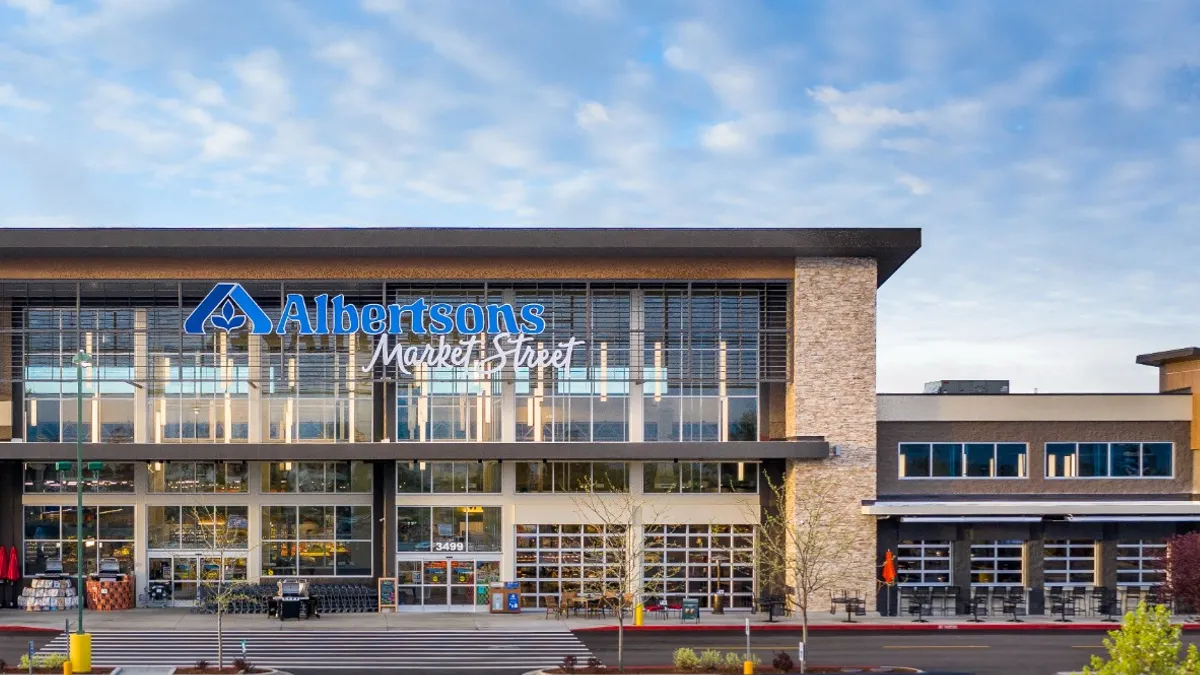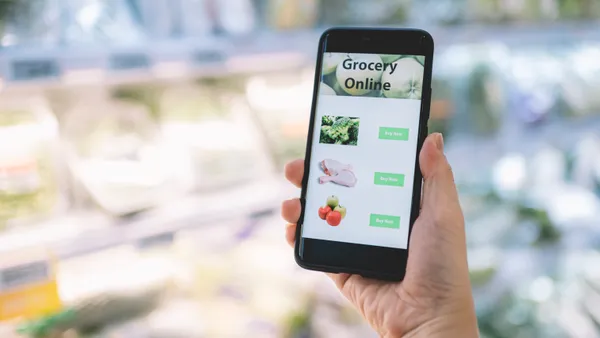Dive Brief:
- Albertsons will stop using its own vehicle fleet to fulfill delivery orders in "a variety of market areas and states" beginning Feb. 27, a spokesperson for the chain said. The grocer plans to rely on third-party fulfillment providers to transport orders to customers in these areas.
- Los Angeles news outlet Knock LA first reported Albertsons' plans to transition delivery from its own fleet to contractors across stores in California, including Vons and Pavilions. According to a source with knowledge of the company's decision, the eliminated delivery positions are non-union. The transition to third-party delivery companies is also not linked to California's recent passage of Proposition 22, as media reports have suggested, the source said.
- Albertsons is backing away from its longtime practice of using its own workers and trucks to deliver orders following a year when online grocery revenue surged across the board. Last month, The Dallas Morning News reported that the company's Tom Thumb chain in Texas plans to shift from its own delivery fleet to third-party companies.
Dive Insight:
Albertsons has long relied on a combination of in-house employees and contractors provided by companies like Instacart and Shipt to deliver e-commerce orders — making it something of an anomaly among industry players that have primarily relied on third-party companies to handle costly last-mile fulfillment.
But while that dual-pronged approach has allowed Albertsons to maintain a level of control over its online operations while also gaining access to customers and logistical support offered by the third-party providers, it appears the company no longer believes the benefits of running its own delivery services are worth the cost.
Although e-commerce has boomed during the pandemic and helped companies nab new customers, online orders are significantly more expensive to handle than in-store purchases, prompting grocers to carefully examine their operations with an eye toward increasing efficiency. According to one recent projection, more than 20% of grocery orders will come through e-commerce by 2025.
“This decision will allow us to compete in the growing home delivery market more effectively,” Albertsons said in its statement. “Since the COVID-19 outbreak, our e-commerce business has risen to new heights and has become more strategically important to Albertsons Companies. Our goal is to truly make e-commerce a competitive advantage.”
Media reports have suggested that Albertsons elected to increase its reliance on third-party companies in response to the November passage of a California ballot initiative that exempts delivery platforms from a state law that requires employers to reclassify gig workers as employees. That measure, known as Proposition 22, drew support from app-based companies like Instacart, which argued that the cost of providing their workers with benefits afforded to employees would be prohibitive.
The United Food and Commercial Workers International Union (UFCW) condemned Albertsons' actions and called on the grocer to change its mind. “Exploiting the passage of Proposition 22 to destroy the good-paying jobs of these dedicated frontline workers, in the middle of this public health crisis, is simply wrong,” UFCW International President Marc Perrone said in a statement.
However, according to an industry source knowledgeable about the changes being implemented, Albertsons made its decision to pivot toward third-party delivery services “irrespective” of the California measure. The jobs Albertsons is eliminating are non-union, the source added.
In its statement, Albertsons said it made the “strategic decision” to stop relying on its own delivery fleet in certain markets in early December. Around that time, the company also reportedly revealed it would shift the delivery service offered by its Tom Thumb banner in Texas to third-party providers and lay off 97 drivers in the process.
Albertsons did not refer in the statement to any particular markets or banners, and a company spokesperson declined to outline the scope of its transition away from owned delivery at this time. In its statement, the company emphasized that it intends to make other jobs available to all workers affected by its decision to outsource delivery operations.
Albertsons added that it is offering an incentive bonus to workers impacted by its adjustments who remain in their jobs through Feb. 27, when the changes take effect. In addition, associates who stay through the transition but ultimately choose to leave Albertsons may be eligible for severance benefits, the company said.
Along with its peers in the supermarket industry, Albertsons has reaped substantial financial benefits during the pandemic, particularly in e-commerce. The chain reported a 243% increase in digital sales during the second quarter and has been investing in micro-fullment technology in an effort to improve its order-assembly efficiency. Albertsons also is bolstering the online ordering tools it makes available to customers.













